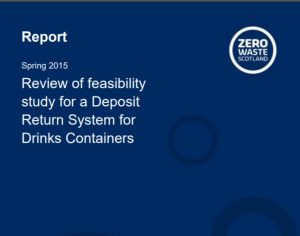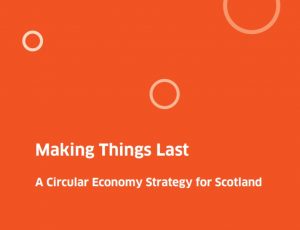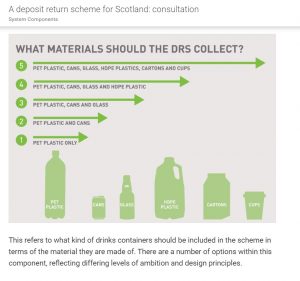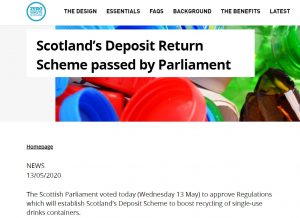Scotland’s Deposit Return Scheme
- Scotland was the first part of the UK to announce the introduction of a Deposit Return Scheme (DRS) for single-use drinks packaging
- The DRS will increase the quality of materials for recycling as they will be sorted and cleaned
- The materials will be non-contaminated, pure, separated and ready for recycling
- The DRS will improve recycling rates and reduce litter significantly
Brief History
RVM Systems installed the first Reverse Vending System in Scotland
Climate Change ACT 2009
The Climate Change Act (Scotland) provides for the “setting-up” of a deposit return scheme.
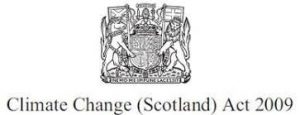
The Zero Waste Plan was published
The Zero Waste Plan was published by the Scottish Government, which included a target to increase recycling to 70% by 2025.
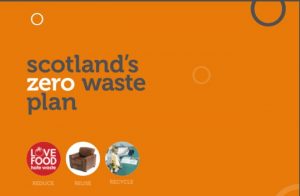
The Waste (Scotland) Regulations Passed
The Scottish Parliament passes The Waste (Scotland) Regulations, which place new responsibilities for recycling on business.
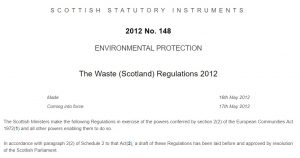
RVS Systems introduced the first DRS pilot in Scotland
This was to recycle glass bottles, plastic bottles and drink cans
RVM Systems undertook DRS ‘pilots’ at IKEA stores in Edinburgh and Glasgow with funding from Zero Waste Scotland. The pilot schemes, named ‘Recycle and Reward’ were a huge success and helped create a case for the Deposit Return Scheme. (link)
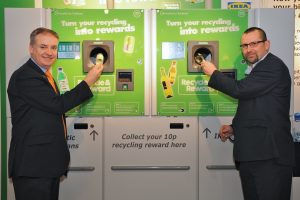
Scottish Government publishes its national litter strategy
The Scottish Government publishes its national litter strategy and introduced the carrier bag charge.
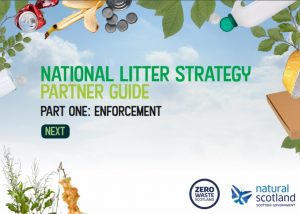
Zero Waste Scotland publish feasibility study
Zero Waste Scotland publish a feasibility study on where a Deposit Return Scheme could work for Scotland. Following consultations with stakeholders, Zero Waste Scotland published research findings about potential Deposit Return Schemes for Scotland. (Link)
Circular Economy Strategy published
Scottish Government published its Circular Economy Strategy for Scotland entitled ‘Making Things Last’. (Link)
RVM Systems feature on BBC News
On the 4th of September 2017 we participated in a News item about Deposit Return Schemes and Reverse Vending with STV. (link)
Nicola Sturgeon announced Scotland will introduce a Deposit Return System for drinks containers
On the 5th of September 2017 Nicola Sturgeon announced that Scotland will introduce a Deposit Return System for drinks containers. (watch video)
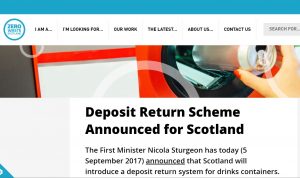
Scottish Government began a Consultation period
In June the Scottish Government began a Consultation period on possible approaches for the Deposit Return Scheme and undertakes public engagement events across all 32 local authority areas in Scotland. (Link)
Consultation results announced
In February Scottish Government publishes its analysis of the consultation. (link)
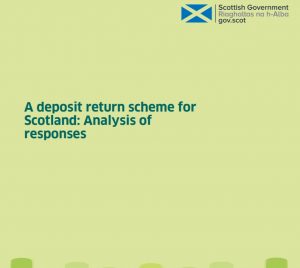
Return to Retail Deposit Return Scheme announced
On the 8th of May 2019 Environment Secretary Roseanna Cunningham told MSPs at Holyrood that a "return to retail" model would be adopted.
Glass will be included in the Deposit Return Scheme
September 10th 2019 marks the first time the Scottish Government have officially said glass will be included in the Deposit Return Scheme.
On this day a public consultation started.
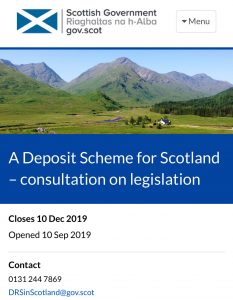
Scotland unveils start date for Deposit Return Scheme as July 2022
The regulations for the introduction of a Deposit Return Scheme in Scotland has been published today (16 March).
Accompanying statement for Deposit Return Scheme (Scotland) Regulations 2020, prepared in accordance with Section 97 of the Climate Change (Scotland) Act 2009.
The introduction of a deposit return scheme in Scotland will be delayed until July 2022 to give businesses more time to prepare and allow them to focus on dealing with the effects of the coronavirus, Environment Secretary Roseanna Cunningham has announced.

Important milestone in Scotland’s Deposit Return Scheme reached:
On the 29th April 2020 an important milestone in Scotland’s Deposit Return Scheme was reached.
The Environment, Climate Change & Land Reform Committee backed the regulations.
They will now go forward to Parliament with Committee support.
Scotland’s Deposit Return Scheme passed by Parliament
The Scottish Parliament voted on 13 May 2020 to approve regulations to establish Scotland’s Deposit Return Scheme to boost recycling of single-use drinks containers. Read More
The scheme will see people pay a 20p deposit on metal cans and PET plastic and glass bottles, refunded when they’re returned for recycling.
The final regulations, which were laid in the Scottish Parliament in March, maintain the ambitious approach to materials, with glass included alongside PET plastic and aluminium and steel. Following consultation with island communities, feedback from the Scottish Parliament’s Environment Committee and stakeholder input, the Scottish Government made changes to the regulations. These include a commitment to review the performance of the scheme by October 2026, including the deposit level, materials and the collection targets.
Drinks producers can join a scheme administrator to fulfil their obligations
June 22nd 2020 marks the first time the Scottish Government have officially announced that application can be made to become a Deposit Return Scheme Administrator.
The administrator(s) of the scheme will be responsible for its day-to-day management.
Scotland's Deposit Return Scheme for bottles and cans creates new obligations for drinks producers. Most drinks producers are likely to nominate a scheme administrator to fulfil these on their behalf.
(Link)
The Scottish Government has today brought forward legislation to make it easier for retailers getting ready for Scotland’s Deposit Return Scheme.
With the scheme set to start in summer 2022, retailers across the country are looking to install reverse vending machines (RVMs) to accept returns of empty bottles and cans.
To support their efforts, the Scottish Government has laid an order before the Scottish Parliament. If passed, the order will remove the need for planning permission for an RVM and associated structures, subject to certain criteria being met.
These criteria, which include things like the size and location of the RVM, have been designed to be as inclusive as possible without adversely impacting the local environment.
Subject to parliament’s approval, the changes will come into effect on 30 October.

Amendment Order 2020 comes into effect from today
The Town and Country Planning (General Permitted Development) (Reverse Vending Machines) (Scotland) Amendment Order 2020.
Retailers in Scotland will no longer need planning permission to install reverse vending machines for the country’s deposit return scheme for drink containers.
You can find the full details of the legislation, including the criteria, HERE
The Scottish government to publish guidance on how retailers can apply for Deposit Return Scheme exemptions.
The Scottish government would support an exemption for a retailer who agrees an alternative return point with another premises,or, if it is physically impossible to operate a return point without compromising other legislations, including health and safety or food standards.
 The Scottish Government confirmed today that it had approved the Deposit Return Scheme administrator application of Circularity Scotland, (https://circularityscotland.com ) a not-for-profit body which represents a combination of drinks producers, trade associations and retailers.
The Scottish Government confirmed today that it had approved the Deposit Return Scheme administrator application of Circularity Scotland, (https://circularityscotland.com ) a not-for-profit body which represents a combination of drinks producers, trade associations and retailers.
https://depositreturnscheme.zerowastescotland.org.uk/circularity-scotland-appointed
Scotland was the first part of the UK to announce that it is bringing in a Deposit Return Scheme for drinks packaging.
Zero Waste Scotland have been tasked by the Scottish Government with advising on the design of Scotland’s Deposit Return Scheme, working with partners to provide support and advice on its implementation.
Scotland - Reverse Vending
With an established Reverse Vending sales team, service and maintenance team and a deposit return team all working from large offices in Edinburgh we are here to help you! We have large Reverse Vending warehousing, RVM offices and a Reverse Vending showroom in Edinburgh. We have spare parts hubs throughout Scotland and hold a large selection of Reverse Vending Machines (RVM’s) and RVM Systems on stock in Scotland.
Copyright © 2021 RVM Systems. All Rights Reserved.

